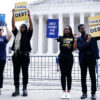Children served by private adoption and foster care organizations are finding themselves among the victims of collateral damage of state decisions to legally recognize same-sex couples. From county courts to the U.S. Congress, the debate over protecting the conscience rights of religious institutions is heating up.
Before Illinois passed a civil union law this spring, proponents of the measure promised the legislation would have no adverse effect on the religious liberty of private adoption agencies. Yet, just a few months after passage of the law, Illinois is trying to terminate all contracts with Catholic Charities. This week, a Sangamon County judge granted a temporary injunction against the state’s decision to end its relationship with the agencies, citing the significant harm such an abrupt termination would cause to children currently in Catholic Charities’ care.
This week’s legal tussle is just another episode in Illinois’ contentious battle over religious freedom. The state is using the new civil union law, lacking an explicit protection for religious liberty, to claim that Catholic Charities is violating Illinois’ sexual orientation non-discrimination policy. Catholic Charities abides by a long-standing policy of referring unmarried, cohabitating couples – regardless of sexual orientation – to secular organizations. An August trial will determine if the organization’s policy violates the new civil union law and whether it will be forced to stop serving 2,000 of Illinois’ most vulnerable children.
Similar challenges may soon haunt religious adoption agencies in New York. When the Empire State legalized same-sex marriage a few weeks ago, an ill-defined protection for religious liberty raised concerns that religious adoption agencies may be forced to violate their beliefs about marriage and family – or close their doors. As the law comes into effect next week, some have predicted an increase in adoption inquiries by same-sex couples. If true, clarification of religious liberty protections in the same-sex marriage law may come sooner rather than later.
Threats to the religious liberty of private adoption agencies are not confined to state legislatures. Representative Pete Stark (D-CA) has introduced legislation that would severely undermine the rights of conscience of foster care and adoption agencies across the country. The “Every Child Deserves a Family Act” would effectively strip both the funding and legitimization of private adoption providers who believe that children deserve the opportunity to experience the unique benefits of being raised by a married mother and father.
Good reasons of broad civic importance exist for government to honor marriage and promote stable, mother–father households. Where government chooses to act contrary to this goal, policymakers should guarantee robust religious liberty—not impose burdens hostile to the conscience of institutions whose work advances civil society.
To track policy updates on family and religion, subscribe to the Richard and Helen DeVos Center’s weekly newsletter, Culture Watch.



























